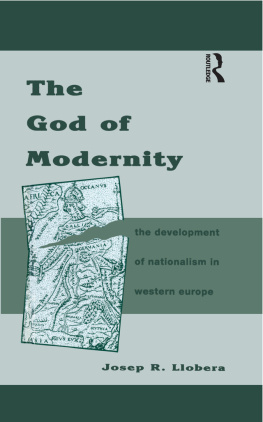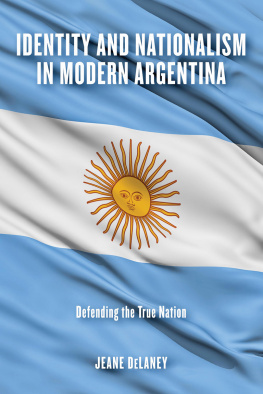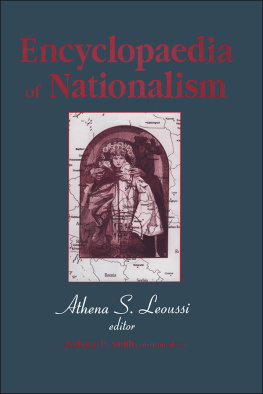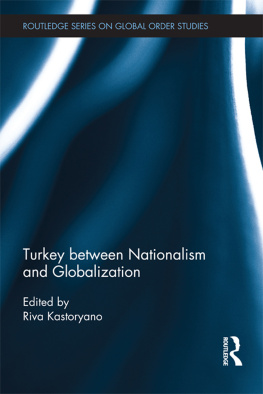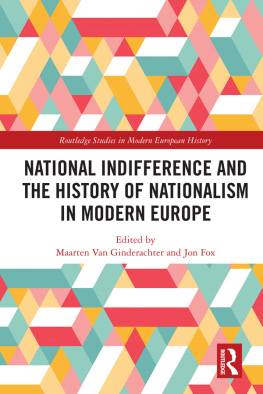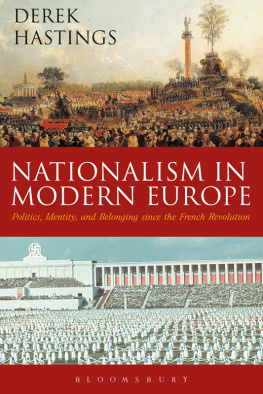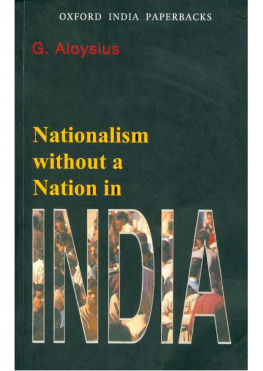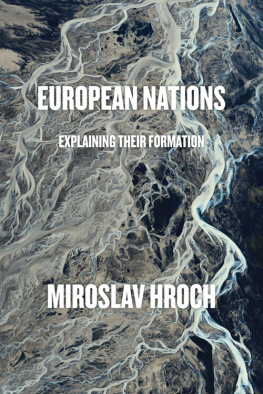The God of Modernity
Berg European Studies Series
General Editor: Brian Nelson (Monash University, Melbourne)
Advisory Board: Michael Biddiss (University of Reading), John Flower (University of Exeter), Paul Michael Ltzeler (Washington University, St. Louis), David Roberts (Monash University, Melbourne), Tony Judt (New York University), Walter Veit (Monash University, Melbourne)
The God of Modernity
The Development of Nationalism in Western Europe
JosepR.Llobera
First published 1994 by Berg Publishers
Published 2020 by Routledge
2 Park Square, Milton Park, Abingdon, Oxon OX14 4RN
605 Third Avenue, New York, NY 10017
Routledge is an imprint of the Taylor & Francis Group, an informa business
Josep R. Llobera
All rights reserved. No part of this book may be reprinted or reproduced or utilised in any form or by any electronic, mechanical, or other means, now known or hereafter invented, including photocopying and recording, or in any information storage or retrieval system, without permission in writing from the publishers.
Notice:
Product or corporate names may be trademarks or registered trademarks, and are used only for identification and explanation without intent to infringe.
Library of Congress Cataloging-in-Publication Data
A catalogue record for this book is available from the British Library.
British Library Cataloguing in Publication Data
A catalogue record for this book is available from the British Library.
ISBN 13: 978-0-8549-6921-0 (hbk)
ISBN 13: 978-0-8549-6940-1 (pbk)
I have been working on this book for many years and both students and colleagues at Goldsmiths' College have helped in many ways the pursuit of an endeavour which appeared at first rather awesome. If I had to single out individuals, two colleagues who have been particularly supportive are David Lazar and Mike Levin.
As a member of the Historical Sociology Society I have enjoyed over the years the privilege of being part of a group of people who have offered me invaluable critical support. In relation to the present project I have learnt much from Salvador Giner, John A. Hall and Michael Mann and I am particularly grateful to Nikos Mouzelis and Anthony D, Smith for their kindness and intellectual stimulation.
I owe the greatest debt to Ann MacLamon who has read chapter after chapter, offering concrete suggestions to make it more grammatical and readable. Without her encouragement and understanding the book might have never been finished.
The section on Gallia in was published in a slightly different form in the Journal of Historical Sociology, volume 7 issue 3, 1994.
This book is written in the passionate but scholarly conviction that nationalism represents a major theoretical and political challenge for the foreseeable future. As an ideology it has been haunting us for at least two centuries, but somehow we have failed to come to terms with it. Furthermore, there is a sense of urgency in the present political conjuncture, partly generated by unsatisfied nationalist demands that are exploding around us. Some people had hoped, naively, that if they kept repeating that nationalism was on the wane, it would eventually really vanish. But surely the crux of the matter is to ascertain which societal conditions make it possible. Likewise, the continued condemnations of nationalism as evil particularly the nationalism of others have had limited effects, perhaps because many people have seen the horns of Leviathan behind the high-ground moralizing. In the final instance, we must be able to account for the consciousness of national identity and the subjective feelings of social communion generated by the participation in acts of national celebration.
It is not easy to read the signs of the times. On the one hand, many new states, in Africa and in Asia, as well as some of the old European states are suffering nationalist ravages in the form of claims for autonomy or for outright independence from subjected (ethno)nations within their borders. Out of the collapse of the Soviet Union and Yugoslavia dozens of new states have emerged. On the other hand, attempts are being made at creating new identities, such as the idea of a European 'community'. More disturbingly, we are not certain beyond some superficial similarities that the label 'nationalism', when applied at a world-wide level, covers the same realities. Is Islamic fundamentalism, for example, a kind of nationalism? It is for these reasons that the book is limited to Western Europe, the birthplace and lieu classique of nationalism. It is my belief that any theory of nationalism should start by trying to account for the convergence and development of nationalism in this area. Only when we are clear about the meaning of nationalism in Western Europe can we hope to come to terms with its diffusion to other parts of the world.
The nation, as a culturally defined community, is the highest symbolic value of modernity; it has been endowed with a quasi-sacred character equalled only by religion. In fact, this quasi-sacred character derives from religion. In practice, the nation has become either the modern, secular substitute of religion or its most powerful ally. In modern times the communal sentiments generated by the nation are highly regarded and sought after as the basis for group loyalty. As a symbolic value, the nation is the stake of complex ideological struggles in which different groups participate. That the modern state is often the beneficiary should hardly be surprising given its paramount power.
National ideologies are often said to reflect the French clich plus a change, plus a reste la mme chose. In this book I shall maintain that if we want to understand nationalism we should reverse the clich to obtain plus a reste la mme chose, plus a change. In this sense national ideologies are a dialectical precipitate of the old and the new. Though they project an image of continuity, they are pierced by discontinuities; though they conjure up the idea of an immutable ideological core and an adaptable periphery, in fact both core and periphery are constantly redefined.
The history of nationalism in Western Europe offers a good number of examples in which the nation is conceived as a quasi-eternal, motionless reality. The idea of la France ternelle is not only a metaphor of romantic French historiography; in fact it has been a first class ideological weapon of all Republican regimes in France, The echoes of such an idea reverberate even in Braudel's posthumous work on French identity.
Why this pretence of continuity? A physicist might say that the explanation must reside in some sort of irrational fear that peoples have of the historical void. It is true that in its origins and fundamentals national identity is an attempt to preserve the 'ways of our foreparents', but reality is constantly changing and the effect of nationalist ideologies is that we tend to perceive the same image where there are in fact different realities. Even modernising or future-oriented nationalisms must pay lip service to this idea of continuity. Expressed in positive terms nationalism emphasizes the need for roots, the need for tradition in the life of any community; it evokes 'the possession in common of a rich heritage of memories' (Renan). The organic analogy is here an inevitable point of reference. And yet the organic conception of the nation is hardly an adequate theoretical tool to handle the complexities of the would-be modern nation-state. For after all, to the ideologists of the nation-state the cultural definition of the nation, as first put forward by Herder, is always subordinated to political objectives or implicitly abandoned because of recalcitrant internal national heterogeneity.

